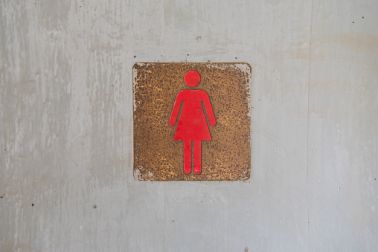Symptoms you should always tell your gynecologist
Symptoms You Should Always Report To Your Gynecologist

Gettyimages.com/Mid-adult, latin descent woman prepares for her annual breast exam, mammogram from her gynocologist doctor at hospital or clinic. Or woman wearing hospital gown prepares for medical procedure. Senior adult, female doctor. Women’s health, issues. Breast cancer awareness.
If you’re like most women, then you probably want to get in and out of the gynecologist’s office as quickly as possible. You might schedule it on your lunch break, hoping to make a full turn around and get back to your desk within an hour of leaving it. You feel proud just for making the appointment, having your gynecologist do a standard exam, and getting on with your day. But you cannot leave it entirely up to your gynecologist to discover important changes. You’re the one who lives in your body every day, and experiences sensations your gynecologist may not be able to identify with the naked eye or even a stethoscope. Since you’ve already made the time to see this important medical professional, shouldn’t you make the most of your visit? Here are symptoms you should always tell your gynecologist, even if you don’t think they’re important.

Gettyimages.com/Couple lying in bed with pensive expressions
Pain during sex
Pain during sex once or twice can happen if you aren’t properly lubricated or your partner is just, um, large. But regular pain during sex can be a sign of a urinary tract infection or genital infection, and should be reported to your gyno.

Gettyimages.com/USA, Utah, Salt Lake City, Portrait of young woman looking away
Lack of self-lubrication
If you’re a pre-menopausal woman in presumably good health, there’s no reason that your body should struggle to self-lubricate. Something as simple as the soap you use or medication you take could be causing the issue. But more serious matters like mental distress or hormonal imbalances could be at work.

Gettyimages.com/Woman holding sanitary towel and tampon
A spotty period
Love MadameNoire? Get more! Join the MadameNoire Newsletter
We care about your data. See our privacy policy.
Definitely tell your gynecologist if you’ve been missing periods, getting them at odd times, or having anything out of the ordinary happen in terms of flow or timing. There are a number of things that could be causing this, but some are serious, such as overactive thyroids and ovarian cysts.

Gettyimages.com/woman with a stomach ache
Lower abdomen pain
If you suffer from debilitating and regular lower abdomen pain, certainly report this to your gynecologist. This can occur if a woman has ovarian cysts, fibroids, endometriosis, and pelvic inflammatory disease. If you are pregnant and suffering from this type of pain, it could be a sign of an ectopic pregnancy.

Gettyimages.com/Urghhh, bad smell.
Funky smells
Funky smells should never go ignored. At the very least, they are often the sign of an infection. But, they could also be a symptom of an unchecked sexually transmitted disease.

Gettyimages.com/Shocked Young Woman Gasps
Odd-looking discharge
Your discharge should be on the whitish side and have the consistency of egg whites. If it turns any color other than white, curdles, or changes consistency, talk to your gynecologist. This can be a symptom of several conditions, including pelvic inflammatory disease and various STDs.

Gettyimages.com/Mid adult woman sitting on the bed and suffering from a headache
Brutal periods
Don’t just accept brutally painful periods that cause you to take sick days from work. Severe and frequent cramping could be a sign of endometriosis or uterine fibroids and should be looked into.

Gettyimages.com/Portrait of male doctor isolated on blue background
Small bumps
If you notice bumps that don’t look like your typical ingrown hair, don’t be shy about having your gynecologist take a look a them. Should you have genital herpes, it’s imperative that you get diagnosed and treated to reduce the chances of spreading this STD.

Gettyimagesc.om/Female Sign On Toilet Door.
Urinary incontinence
While urinary incontinence can occur in older individuals, if women under the age of 60 who are in good health experience this, they should see a doctor. Urinary incontinence usually has mild and relatively harmless causes, but an obstruction of the urinary tract could be at the root of the issue.

Gettyimages.com/Young couple embracing in bed
Lack of sex drive
Sometimes, a low libido has nothing to do with your level of attraction to your partner. Simple factors such as a low-carbohydrate diet can be at play, but more serious ones such as hypothyroidism could be the cause. If you aren’t happy with your level of sex drive, tell your gynecologist.

Gettyimages.com/Woman lying on bed
Failure to orgasm
While it’s quite possible that your partner’s performance or your sexual chemistry have something to do with it, physical issues can also make it difficult for women to orgasm. Certain habits like sitting at a desk all day or even wearing high heels can affect the pelvic floor and make it hard to orgasm. Speak to your doctor about your lifestyle and she can try to help you pinpoint the issue.

Gettyimages.com/Doctor talking with patient at desk in office
Post-sex bleeding
Post-sex bleeding is not normal and shouldn’t be ignored or tolerated. Sexually transmitted diseases such as chlamydia, or conditions like pelvic inflammatory disease, can cause post-sex bleeding.

Gettyimages.com/Ultrasound showing the side-view of a fetus. Ultrasound is a non-invasive, safe method to look at the unborn fetus to check that the baby is developing normally. The newest ultrasound equipment is very advanced and provides clear images of the fetus’s ana
Consistent negative pregnancy tests
If you and your partner are trying to conceive but struggling to, there’s no reason not to involve your gynecologist. Even if you aren’t aware of any health issues that could be causing fertility problems, it’s best to keep your gynecologist in the loop and aware that you’re trying to conceive—it’s an important lens through which she can analyze your habits and prescribe medications.

Gettyimages.com/Mammography
Severe breast pain
Hormonal changes—particularly around your period—can cause breast pain. But if you experience very bad breast pain, even when you aren’t menstruating, talk to your gynecologist. There are some more serious causes of this symptom, such as cysts, or mastitis in pregnant and nursing women.

Gettyimages.com/upset bride
Depression and anxiety
You can, of course, talk to your regular doctor about this. But I’ve found that women have a closer relationship with their gynecologists and feel more comfortable opening up about personal matters with them. A gynecologist can refer you to a therapist.
-

Style, Swagger, And Star Power: Rihanna, Ciara, Olandria, Angel Reese And More Shine At The 2025 CFDA Fashion Awards
-

From Slammer To Glamour: Watch 'Real Housewives Of Potomac' Star Karen Huger Freed Early From Jail In Full Makeup Beat
-

How Fit Women Eat In Group Settings
-

Dishonest Ways Men Get In Your Good Graces



